#the family madrigal analysis
Text
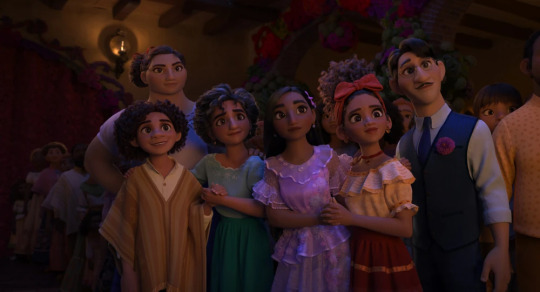
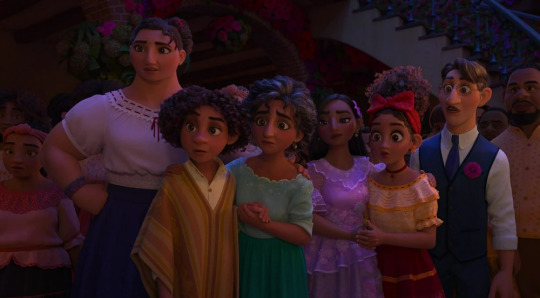
These two screenshot comparisons are VERY telling. Now, before I start, I want to make it clear: This is not me calling the Madrigals "evil" or anything like that, it's just an observation. Kind of a sad one but still a simple observation.
In the first shot, we see all of them listening to Alma's speech. All of staring up at the matriarch with attentiveness and reverence; at the same time, huddling together in closeness and vulnerability - Luisa's hand on Julieta's shoulder. Julieta and Camilo holding each other, Isabela and Dolore holding one another, and Agustin holding onto Dolores' shoulder. We see that they are tight knit and close family that have zero qualms about being affectionate with each other. But, then something happens...
Onto the second screenshot, their closeness doesn't change but their attention and attitudes shift. Why? They just witnessed Mirabel (whose ceremony failed) agreeing to help Antonio to his door. And they don't smile at Mirabel's sweet gesture even after shock dissipates. All of their reactions are either shocked (Camilo, Dolores, Agustin), concerned (Julieta), quiet understanding (Luisa), or quiet disapproval (Isabela, when asked about her reaction Jared Bush confirmed on Twitter that Isabela made that face because she thought Mirabel was going to mess up Antonio's night).
And given how Mirabel was positioned with Antonio, she most likely noticed the reactions of her family. And even though it's not said, I think it paints a clear picture of something even Mirabel most likely knows but doesn't say out loud: For all the talk about familial love, the Madrigals don't have the highest respect for Mirabel. I am NOT saying they don't love her, but they don't fully respect her.
#disney#encanto#luisa madrigal#camilo madrigal#julieta madrigal#isabela madrigal#dolores madrigal#agustin madrigal#madrigal family#favfams#my posts#fam analysis
175 notes
·
View notes
Text
Let's talk about

Them.
The majority of the cold family wears shirts/blouses. I'm not so sure what Julieta has, but she has separate clothes too.
Agustin and Mirabel both have white shirts, which is references to the fact that they don't have a gift. While Luisa and Julieta have colour. Julieta's is also much more evident as she is closer to Alma and Pedro on the family tree.

Meanwhile, Isabela is the only one who wears a one-piece dress. This connects her to Alma and Pepa
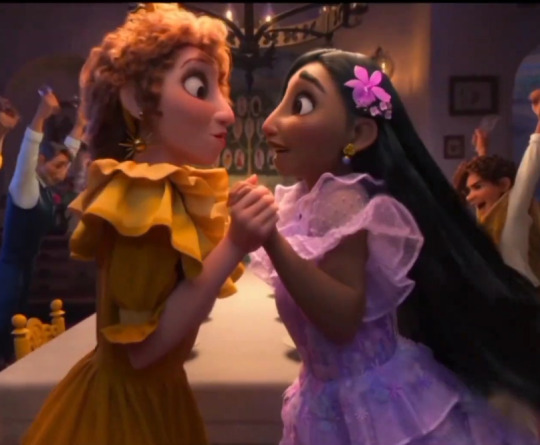
And the upper part of Isabela's dress is really simulare to Pepa's which I never realized
Also. Julieta and Agústin have long sleeves (to the elbow and wrist) compared to their daughters who's sleeves are going to the middle of their upper arms. Makes a point to the fact that they're obviously younger
#encanto#encanto analysis#luisa madrigal#mirabel madrigal#isabela madrigal#julieta madrigal#agustin madrigal#the cold family#i just love how much effort was put in their designs
43 notes
·
View notes
Text

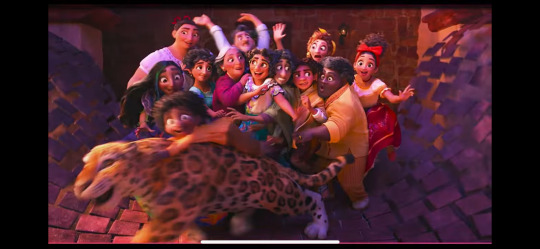
I will forever love the symbolism in how the family picture has changed. For one, Mirabel and Bruno are actually part of this one. And it’s not a perfect posed one like at Antonio’s gift ceremony, it’s chaotic and full of laughter. It’s flawed; reflecting how the Madrigals are finally learning to accept their flaws and show them off. And my favorite bit of all, the lack of powers. In the first photo everyone is either using their power or making a pose based on the power. But in the last photo only Casita uses any kind of power. The focus is now no longer on the magic, but on the family. On their flawed, chaotic, beautiful family.
127 notes
·
View notes
Text
Waiting on a miracle begins as a reprise of “the family madrigal” because that entire song is about her trying to keep up her facade but ultimately the hidden insecurities can’t stay down forever and it’s the very beginning of waiting on a miracle where the facade CRACKS.
#encanto#encanto disney#disneys encanto#mirabel madrigal#oh look another post about woam#this song is so deep I could operate on it surgically#like waiting on a miracle is LITERALLY a direct continuation of family madrigal because the issues that were present there didn’t go away#I love this song#encanto song analysis#waiting on a miracle#the family madrigal#mirabel and casita really are besties they literally both started cracking at the same time🤞#encanto songs#encanto song discussion
29 notes
·
View notes
Text
Isabela Madrigal, Heights and Vine Symbolism
Before “What Else Can I Do?”, Isabela is repeatedly positioned higher than Mirabel. She appears on the landing when they’re preparing the birthday party in a dramatic entrance and later rolls her eyes at Mirabel’s claims of the cracks from up there too, while Mirabel is on the ground floor both times. During the argument she drags Mirabel flat on the floor and stands tall over her. Heck, her bed is even on a raised platform with stairs leading up to it.
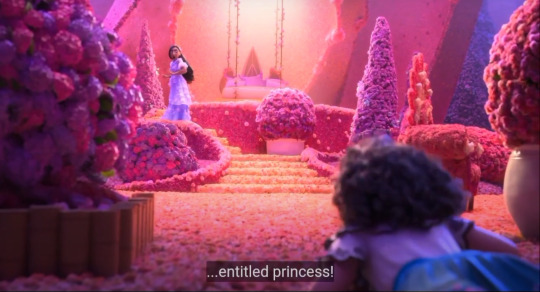
This shows the imbalances between them of others and especially Alma’s regard, their privilege and implicitly inherent worth. Everyone looks up to Isabela… and she looks down her nose at Mirabel. We sympathize more with Mirabel in these scenes, her feeling to herself and us not just a helpless victim of her sister’s pride, but more reasonable and, well, down-to-earth.
Flowering vine swings in particular symbolize this idea. Her bed, as seen there, is attached to vines strong enough to lift and swing it. Based on how she lowers it when Mirabel first enters her room, I infer that she pulls it up into the enclosing curtains (said by the creative team to represent how she feels trapped) to retreat even further from the world when she’s upset, hiding her messy, ‘bad’ negative emotions out of anyone’s sight and earshot. Besides the bed being a big swing, she’s suspended from vines in the “Did somebody say flowers?” moment; in “We Don’t Talk About Bruno” complete with a spotlight, her vision seemingly the only desirable one foretelling her happiness and prosperity; and in promotional art designed to effectively present her pre-story character, suggesting it’s in-universe something she does often and is known for. Her trademark as “Señorita Perfecta Isabela”.
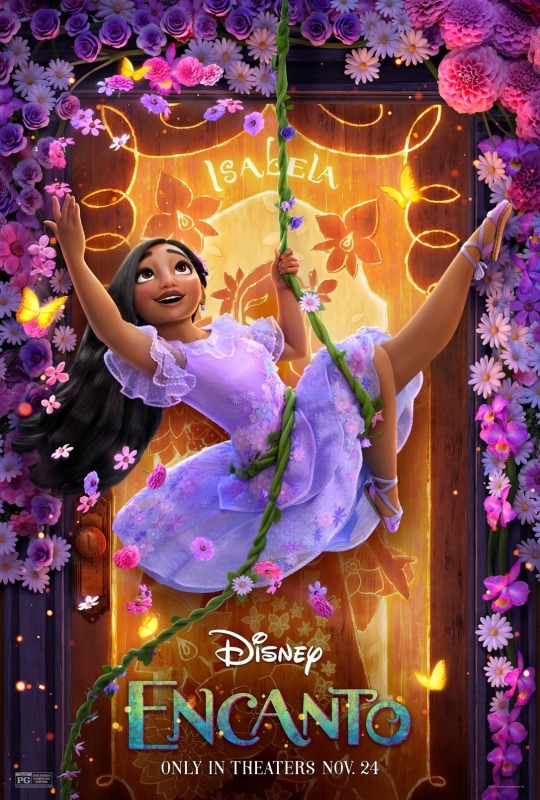
This demonstrates her skill, strength and precision with her gift, and does a lot to serve her perfect image - and Mirabel’s perception that she’s spoiled and has had everything handed to her. It’s an efficient method of transportation that no ordinary person could use. A glamorous, elevated vehicle reserved for a specific individual and allowing them to sit connotes privilege and superiority, like litters. Her being seated, the vines descending from somewhere unseen rather than us watching her grow them from scratch, their smooth, fluid movement and her not visibly exerting herself in the slightest make her command look totally effortless. It’s easy to forget that she’s controlling the vines at all instead of getting (more) cosmic help. And look at her gorgeous hair and dress as they swish and flow with the elegant motion! Look at the flowers she didn’t need to add, but did, because all that she touches is beautiful to behold! Lovely Isabela, an angel deigning to visit Earth from the heavens. Perfect Isabela, too good to take the stairs like a normal person. What a vain fucking showoff.

In the early part of “WECID” when Mirabel isn’t actively listening to her, she uses vines again. Yet it feels different. She sits on another swing to travel to the location of the verse where she explicitly describes the monotony, oppressiveness and exhaustion of always growing the same perfect flowers and always keeping up a shallow facade. “I grow rows and rows of roses/Fleur de mayo, by the mile/I make perfect, practiced poses”. Oh. It does take effort. It takes energy and time and thought, enough to leave her drained of enthusiasm for life itself. She’s been silently giving her whole self away all these years. Furthering the revelation that using her gift, at least in this way, is actually taxing, she then manipulates the vines to swing her bed not ‘effortlessly’ through her magic but with her arms and weight like a normal person. The movement is a defiant, forceful pull, as if straining against restraints or seizing her personal autonomy. The only time we’ve seen force anything like that from her before is…

emphatically ripping a flower off her own vine while ranting about how the arranged proposal she was going to accept, her ultimate sacrifice in the name of her family, has been ruined.
Now we realize: to Mirabel, the vines’ symbolism is that Isabela is better than her. To Isabela, they’re puppet strings. She doesn’t look in control of them because she isn’t in control of her life, merely a pretty doll Alma moves around, pressured to be passively pulled wherever the supposed needs of “the family” demand. A precarious position that she must constantly work to keep her balance in, lest she irrevocably, unforgivably fall from grace. She literally uses vines as a barrier between her and Mirabel. To try to remove the ‘imperfection’ of Mirabel from her room. They are tools of restriction, division and imposing your will on someone else.
But during “What Else Can I Do?” she thinks of ascension and heights positively. She wants to “climb”, to “rise” right “through the roof, to the skies”, and reflects this by rising on a growing palm tree and going up to the roof, jumping and riding plants higher than she’s ever been before. What changes?


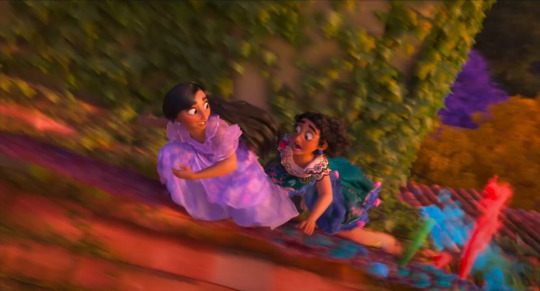
Instead of hanging, she’s standing on her own two feet. On the foundations of her family home and plants she constructs for herself. When she does swing from vines, like when leaping off the roof and later racing to save the candle, she grips them unsupported Tarzan-style, which feels much more active and independent. She even rides on thicker, sturdier moving vines! She initially leaves Mirabel behind to climb after her, Isabela caught up in the rush of discovering and experimenting with freedom of expression and Mirabel still seeing her as a means to the end of protecting the miracle and family (hey, like Alma does… it’s as if they’re foils or something!). But by the bridge they’re both on top of the palm tree.
They’re both on top of the palm tree because Isabela helps Mirabel up. She wants to share her real self with her, for her to be part of this. This is the first moment when she directly addresses Mirabel and asks for her opinion: doesn’t she want freedom and authenticity too? Mirabel is inspired to really listen to her sister, reevaluate her assumptions about her and process the new side of her she’s seeing. Her conclusion - “All I know are the blossoms you grow/But it’s awesome to see how you rise” - is that she likes, loves, even admires the true Isabela and wants to understand and see more of her, no doubt wishing that they’d had this conversation sooner. She chooses to embrace and support her. Isabela sinks to her knees and Mirabel in response sits down next to her, so even their standing height difference is eliminated.

They finally see eye to eye. They rise together.
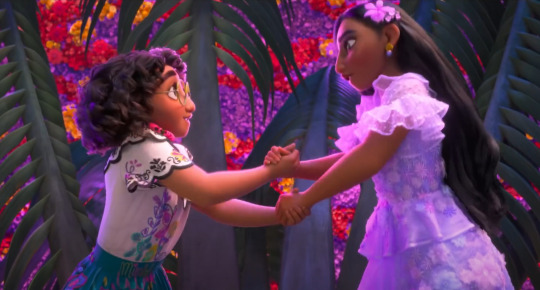
After that, they stay on the same level throughout the rest of the movie.

The toxic imbalances of power, autonomy and perceived value are gone. They’re equals and respect each other accordingly. At the end of the song, Isabela lets herself fall into a cushioning pile of her new, vibrant flowers, safe in the knowledge that she can catch herself.
#you know what that is? growth#literally#of a lot of plants#I’m sorry i couldn’t resist#isabela madrigal#i love her#if i cannot find in-depth analysis of her i will create it#curse tumblr’s ten-image limit#i wanted to add images for all the scenes#maybe this would have worked better as a video essay#mirabel madrigal#encanto#disney encanto#madrigal family#familia madrigal
407 notes
·
View notes
Text
Can't stop thinking about Isabela and Mirabel as reflections of who Alma is now and who she used to be before the tragedy. The way she clings to Isabela's perfection is reminiscent of how she uses her own perfrct image to drive away the past that haunts her, and while her pushing Mirabel away is due to her own fears of the Miracle fading away, I wonder how much of her avoidance is because of Mirabel reminding her too much of who she used to be?
People often say that Mirabel mirrors Pedro, but I'd argue that she's a perfect reflection of who Alma was supposed to be if only life hadn't dealt her such a cruel hand. Does she look at her and think of simpler times? Does Alma look at Mirabel and remember how she used to have a girlhood that was taken away far too early in life?
It's strange to think that despite Isabela having the life that Alma wanted to have for her and Pedro, Mirabel—the granddaughter that she has disconnected from—is the one that actually embodies her the most. And Mirabel herself doesn't even realize that.
#encanto#character analysis#cant really properly put into words what im thinking rn#but its just#i cant help but wonder if alma was running away from her past self by disconnecting from mirabel#because it hurts to remember that she used to be so happy#and it makes her angry that she used to be so happy when the world can be so cruel#the river scene really threw me for a loop because of this#i saw young alma but i also saw mirabel in her#and its so heartwrenching how a river marred by tragedy can show the parallel between family members of different generations#actually dying rn#mirabel madrigal#alma madrigal#isabela madrigal
35 notes
·
View notes
Text
Maturing is realizing that the Madrigal family are all good people, they just lost sight of what was important over time because they were all so focused on their own struggles and desperately keeping their magic afloat that they ended up hurting each other and either not being there for one another, or not recognizing the other’s hardships. They’re a family who loves one another, but they’re broken due to the generational trauma. Certain characters hid their true feelings, certain characters weren’t there for others, certain characters kept their mouth shut and didn’t intervene, certain characters didn’t see or understand others. They were told how important this miracle is practically all their lives and how they can’t take it for granted that they eventually forgot about what was most important to them in the beginning, their love for each other. The Madrigals being a broken and flawed family but a family filled with good people who still care about one another deep down are statements that should coexist. 🕯❤️
#encanto#jared bush#walt disney animation studios#disney’s encanto#walt disney#disney animation#bryan howard#family madrigal#mirabel madrigal#isabela madrigal#alma madrigal#encanto movie#pepa madrigal#bruno madrigal#dolores madrigal#camilo madrigal#julieta madrigal#encanto disney#charise castro smith#encanto analysis#encanto take#agustín madrigal#antonio madrigal#felix madrigal#luisa madrigal#encanto themes#pedro madrigal#madrigal#la familia madrigal
204 notes
·
View notes
Text
Shower Thoughts
Bruno's Stone Hand: Your Future Awaits

I've been thinking about this statue and trying to get into Bruno's head in case he decided to put it up, and it didn't just appear as a result of Casita's magical rooms. What was the motivation behind it? How long has it been there? And most importantly, what does it mean?
Meaning 1: "Climb all those stairs to get a vision from me."
The most on-the-nose interpretation is that this was simply meant to be a signpost to his Vision Cave for the villagers or other visitors. I can imagine it was set up when there were already a decent number of stairs in Bruno's room. At least, it would make the most sense at that point in time.

Meaning 2: "The way to Heaven/God in Christianity."
So, I saw some gravestones with a similar engraving: a hand with its forefinger pointing up to indicate the deceased's soul has risen to Heaven.

This was a prevalent symbol in the Victorian era (1837 - 1901). Of course, this concept doesn't have to apply to 19XX's Colombia, but it's an interesting thought, especially when one considers the heavy Catholic themes in Encanto and, perhaps, that Bruno might be a little old-fashioned/traditional in one way or another.
Also, most references of these headstone images I found feature the right hand as the "correct" hand for this symbol, regardless of if it's shown from the front or back. Bruno's possible left-handedness shown throughout the movie and his rock statue subverts this theme. He is different, and he is "wrong" in the eyes of the villagers.
Meaning 3: "Now listen up, the Prophet is speaking."
Bruno's expressive hand gestures often come into play when he tries to share his thoughts with other characters (Mirabel and Alma, for example.) I imagine their intention has changed from "Please, listen to me." to "May I just… please… say some–– Okay, never mind." over the course of his life.
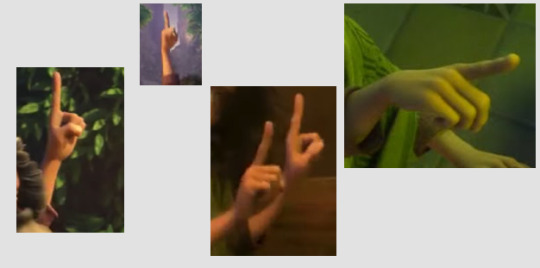
#encanto#encanto meta#encanto analysis#shower thoughts#my meta#bruno madrigal#encanto bruno#la familia madrigal#madrigal family#mirabel madrigal#alma madrigal#bruno's room#encanto details
233 notes
·
View notes
Text
Encantober - Transformation
Hello, can I talk your ear off about the music in Encanto, specifically Bruno's instrumental themes????? What if I promise to give you some unsolicited character writing tips on the side....😁
So was on the struggle bus with my current WIP that focuses on Bruno, and wanted to reconnect with the characters in order to better ground my depictions of them. Rather than watch the movie (again), I decided to listen to the instrumental versions of Lin-Manuel's songs as well as Germaine Franco's amazing score, and wrote a little way longer than planned analysis to condense my thoughts.
I'm nerding out a bit about it all (okay, I'm nerding out a lot…), so I wanted to post it for my fellow Encanto lovers to nerd out with me. Today's Encantober theme is transformation, so thought it was a fitting day to post it :)
A rough musical analysis by a very non-musical music lover below the cut 😊
1) Songs: WDTAB/All of You
To recognize Bruno's main instrumental theme, it helps to start with the instrumental version of All of You. It's easy to pick out here, as it plays in the part where he is singing (and in one other place…more on that later). Listen in at 1:08. This is when Camilo would be singing "So, we're gonna talk about Bruno?"---and leads right into when Bruno sings for himself. His theme is a sort of boom dih dih dih boom dih dih dih boom dih…dih…dih (yes, those are the technical terms), a strong base hit interspersed with plucky-piano.
What I love about this theme is how it mimics the movements of the character, and defines how he interacts with and perceives his environment.
Bruno often moves with big jerky movements sandwiched by small fidgets—hesitation, explosion, hesitation/doubt, explosion, very rat like. When a rat moves, it evaluates the environment, moves, pauses and sniffs some more, moves again. The tip-toe of the piano gives the feel of creeping or gingerly stepping, while the boom recreates the jerk into action, the push to make a big move, framed by caution.
This says a lot about Bruno's perception of the world. He's grown to be wary of his environment, like a rat sensing out danger. If he's gonna move, better make it quick (maybe before he talks himself out of it!), and then pause again to re-evaluate if it's safe to keep going. He avoids detection, tip-toes, sneaks from cover to cover—you can almost see him moving when you listen, shoulders hunched, hood drawn. Bruno is wary of being seen, as being seen has meant danger to him in one way or another. Many fans have interpreted what this danger looked like in many different ways (from social ostracization to actual physical danger), but at the very least we can identify a high level of learned social anxiety that forces him to proceed with caution and keep a low profile when interacting with others (more on that later). Bruno has learned to tread carefully because of how others have perceived him, through the lens of his gift.
Of course, once he's in the walls, fear of being seen takes on a whole new meaning. Discovery at that point would mean the consequences of discovery of the vision as well, and discovery of his shame—he never left/couldn't leave, and has been reduced to a rat in the walls of his own home.
When Camilo is singing, we hear a different feature associated with Bruno—the whine of a synth keyboard (I think?). It gives me major theremin vibes, and the song draws on that classic horror sound to drive home a "villain," seven-foot-frame image of Bruno, as portrayed by Camilo—-and, more importantly, as seen by the townspeople.
Let's backup to WDTAB. If you listen to that instrumental version, you can hear that the synth sound picks up right away (on the line "Bruno walks in with a mischievous grin," no less!). It comes in and out, and even picks up a more complex melodic pattern here. It's the townspeople's fear—but it's not a horrific dread sound; it's actually a bit playful. Now, part of this is because it's a Disney bop, but I like to think that this also points to the nature of rumors—we get enjoyment from spreading them, and the Encanto-folk are clearly eager to dish. Listen to how creepy this guy was! Ooooo doesn't it give you the shivers?! It's like a fun ghost story around the campfire. This juicy piece of gossip is a favorite to share.
BUT Bruno's actual theme—the one we hear when he actually speaks in All of You—doesn't appear until 1:33 of WDTAB. It's when the townspeople are sharing their grievances that we really hear his tip-toe, like he's tip-toeing through the minefield of their complaints. Now we can see the shapes he's learned to step around—you can almost see him weaving through their disgruntled narratives in the song. The music shows that here is where that learned social anxiety was formed.
Note that the theremin synth drops away when Isabela and Dolores sing their parts in WDTAB. When Isa sings hers, the plucked rhythm of the strings mirrors Bruno's plucked string style in his theme, though the melody changes. I think this speaks again to careful footing—they both share anxiety at being found out, being truly seen, and live life having to tiptoe their way through social interactions. Where as Bruno's plucked strings are jerky, Isa's are more graceful. When Dolores picks up, the plucked strings are replaced with a symphonic strings in a very romantic princess-esk style of longing.
To tie things up, let's pull forward again to All of You. In this song, notice the theremin-synth sound also drops away as soon as Bruno speaks, and we don't hear it again. We are left with the real Bruno—meek, anxious, and full of nervous energy, the antithesis of scary. The theremin really only appears in Camilo's part, highlighting again the one character in the song who was really only there for the novelty of the rumor and the story telling opportunity, and had no memory of the real guy. THAT'S Bruno???
In the end of Bruno's part in All of You, the melody overtakes his theme, symbolizing his unconditional acceptance by his mother and sisters and his reintegration into the family.
Also, let's not forget the nod to Let It Go! It's perhaps just an easter egg, but character-wise, I like to think it's also testament to his use of quirky meta-humor to deflect and avoid uncomfortable vulnerability. Does everyone in the room always get his jokes? Nope! But he can still disappear in the confusion!
Character Takeaways, for writing reference:
When uncomfortable, Bruno often moves and speaks in quick, nervous bursts, interspersed with small fidgety movements.
Nervous energy reigns supreme. Bruno hides behind quirky, lighthearted, sometimes meta humor as a way to deflect and avoid being seen/made vulnerable.
Bruno has learned to literally and figuratively tiptoe around the townspeople, and eventually, around his own family. Post-movie/All of You Bruno is unlearning/releasing this social anxiety around his family through the experience of (unexpected) unconditional acceptance
Isabela shares a similar underlying social anxiety to Bruno, though it manifests differently. They both have experienced having to tread carefully around other's expectations
Camilo is full of it. 😆 He feeds off of the environment to parody it, finding his drive in giving the people what they want to see—much like his gift. This can be a boon and a detriment to his character.
Knowing/hearing the real Bruno dispels the rumors that evolved in his absence
2) Instrumentals: The Rat's Lair, Tío Bruno, and It Was Me
I'm sure there is a lot more to say about these three pieces, but my main takeaway comes from the contrast between plucked strings/knocking percussion and wind instruments/bowed strings in Bruno's pieces, and how they reveal his layered character and his developmental arch.
In The Rat's Lair, we get Mirabel's (and our) first real impression of Bruno. Whereas the chase scene leading up to this piece is full of cacophonous, screechy strings (Chasing the Past), this piece has replaced those fearful sounds with plucked strings. We again get that image of tiptoeing, and it's playful. His room is full of mischievous rats, he's nervous and jumpy, and Mirabel is just trying to figure out what the heck is going on. We get a nice contrast between the expected Bruno (scary) and the real Bruno (quirky, but sweet and harmless). Also present are a bunch of percussive knocks, a nod to his superstitious/compulsive knocking.
Contrast this with Tío Bruno. This piece plays when Mirabel first peeks through the crack to the dining room, finally getting a look at the real tragedy of Bruno's situation. Tío Bruno has the main Encanto theme throughout (we also hear it when the Encanto is being created at the beginning of the movie). It's a nod to the miracle, but it's mournful here, with parts in a minor key. The miracle has had tragic consequences for Bruno. Tío Bruno is full of woodwind instruments and bowed strings (as opposed to plucked). Rather than nervous tiptoeing, we get raw emotion, frequently underlined by a sustained guitar tremolo (??) that speaks to the familial tension driving it all. Tío Bruno plays when Mirabel gets past all the nervous deflection and connects with Bruno in a meaningful and vulnerable way. Under it all, Bruno is deeply sad, carrying the dismay of a miraculous gift gone awry and the tragic consequences of his last vision.
Finally, we have It Was Me, which acts as a redemptive contrast to Tío Bruno. In this piece, the plucked strings return (he's nervous, confused by Abuela's unexpected embrace). It then transforms into a grand symphony as Mirabel, Abuela, and Bruno take off on the horse toward the ruined Casita, and then a chorus singing the Encanto theme when Julieta is reunited with Mirabel. It ends with the All of You theme. All of this follows the action of the scenes from Mirabel's perspective, BUT if we look at this from a Bruno perspective, apart from the scenes' action, we get a redemptive arc.
It Was Me carries Bruno's nervous plucked strings (tiptoe, anxiety) to disappear in the Encanto theme chorus (miracle, hope). He is reunited with the Miracle (his family, the true gift) and the sadness of the Tío Bruno theme is changed into the hopeful chorus that the Miracle once was (major key?) as heard in the beginning of the film. From there, the song moves into the to the All of You theme as Bruno is finally on his way to being seen and unconditionally accepted, a true healing moment.
Character Takeaways, for writing reference:
Bruno hides behind humor to deflect away from those vulnerable places within him. Maybe it's painful, maybe it's an attempt to keep the burden from those he loves (a cool analysis on that here!), maybe he's afraid of being rejected for being weak. Regardless, he has a deep sadness hidden underneath the nervous, quirky exterior, and Mirabel is the one to break through to it
When Bruno's defenses are down, the music slows down, and so does the movements of his character. It's like the weight of it all catches up to him, and he drops his attempts to be upbeat and lighthearted. He eventually picks the jumpy style of movement back up again in the film, when Mirabel begins to feel the weight of the situation (OR NOT! It's a mystery, it's a mystery…). In sum, when he is nervous (most of the time), he is deflecting, humorous, playful on the outside, with a deeper sadness carried within.
3) WAIT WAIT MY FAVORITE PART as a FINAL note I swear:
Bruno's theme reappears in a strange place at the end of the movie, in All of You. At 2:56, he's no longer speaking; in fact, he's not even in the scene! What's happening in the song? It's none other than the moment that Dolores opens up to Mariano (I can take it from here, GOODBYE). Bruno's theme underlies Dolores' entire speech to Mariano, but then the theme transforms at the end, rising up and bleeding into the All of You melody.
Why bring him in here? I think it's a moment of redemption. Bruno's 'bad' prophecy for Dolores is cast in a new light. The time pining after the "man of her dreams, betrothed to another," has built up in her this momentum, manifested as courage to speak out and demand what she wants (Wake up and NOTICE me!). At the moment that Mariano verbalizes that he sees her, Bruno's theme transforms into the All of You theme. Dolores is seen, all of her, and the moment arises from the backdrop of her Tío's prophecy. Perhaps this symbolizes a freedom from the confines of the prophecy, but maybe...if not for the years of not having the love she longed for, would she have had the courage to seize the moment when it came? Bruno's prophecy comes true in a way they'd never imagined, and with that comes hope—the promise of transformation.
End of essay 😁
People more musically inclined, please feel free to add to this! Also, please excuse any misuse of musical terms, my musical vocab is wanting. I am a non-musician in a very musical family, so when it comes to music, I often feel like I've missed something important… 😆
#my family is sick of hearing about it#so now you get to!#Encantober#transformation#music analysis#encanto music analysis#it really is an essay#oops#oh well#bruno madrigal#isabela madrigal#dolores madrigal#mirabel madrigal#camilo madrigal
53 notes
·
View notes
Note
When you talk about resemblance, I often think about Dolores.
Like, Mira is a mini Juli. Luisa is mix of Juli and Agustin. Isabela is a copy-paste of young Abuela.
Antonio is a mini Felix (with the same doe eyes that Dolores' have). And Camilo remembers me of Pepa, but people say he looks like Pedro.
So, what about dear Dolores?
You had me wondering, Anon. And I looked up at their beautiful faces and came to some conclusions. Both Felix AND Pepa have protruding ears so it's not something Dolores has because of her gift, but it's from her parents. I think she also has Felix's lips. She also has Pepa's slim build - they're very similar bodywise - rather narrow hips, small waist and chest.
(In comparison, Julieta's girls have her built - with wider hips and bigger chests than Pepa and Dolores (sorry my darlings but u 2 flat))
Dolores has Pepa's face shape:

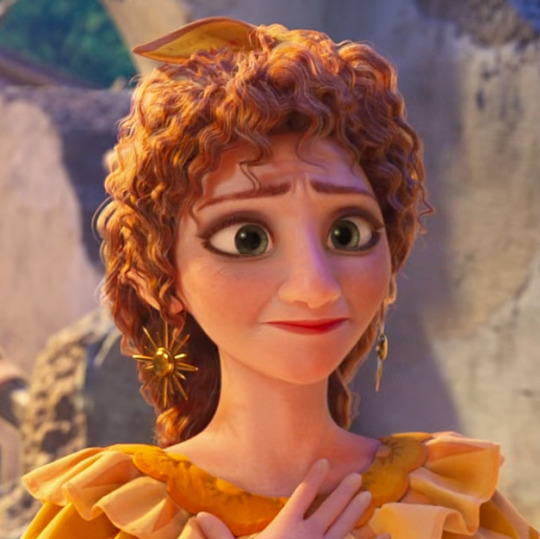
Her eye shape is very similar to Mirabel's, so I think they both may take some features after their relatives on their mothers' side.
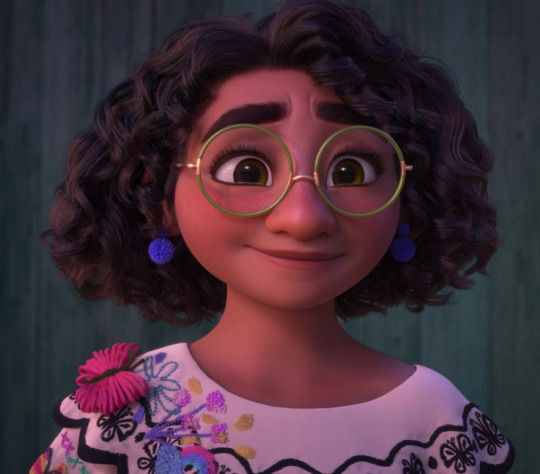

So I think Dolores is a perfect mix between Felix and Pepa with some addition from her mother's side relatives because she shares some things with Mirabel, for example.
#answered#encanto#family resemblance#dolores madrigal#pepa madrigal#felix madrigal#antonio madrigal#warm colours family#mirabel madrigal#cool colours family#la familia madrigal#appearance analysis
112 notes
·
View notes
Text
Antonio’s Vest
I posted about this AGES ago, but it was in a reblog, so I’m giving this theory it’s own post. SO Antonio’s non-gift ceremony outfit is this. Adorable of course.
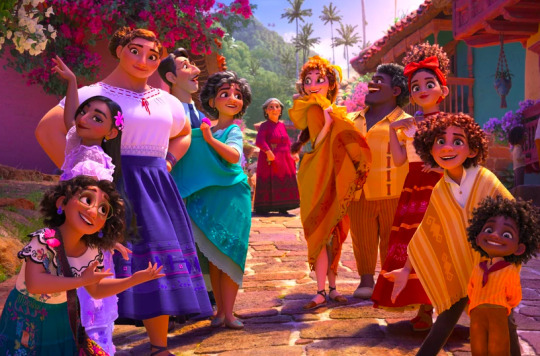
And throughout the entire movie, excluding his white suit for his birthday, that is all that he wears. This pic is from before his ceremony, but even after his outfit doesn’t change. Unlike everyone else in the family, Antonio doesn’t have a motif signaling his gift in his clothing design, just the warm colors signifying his side of the family. Which, of course this makes sense-- he can’t have a motif for his gift on his clothes when he doesn’t have one yet.
BUT!
In all of the promotional photos released by Disney, as well as toys and other merchandise, have an addition to Antonio’s outfit. This vest.

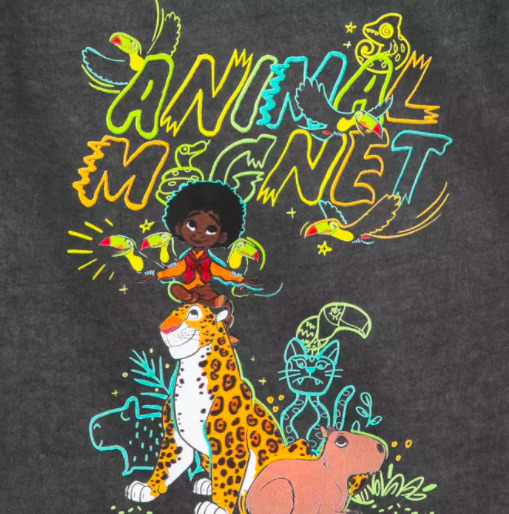

The only hint of a vest as being apart of his outfit in the movie and thus canon comes in the door carving, where he IS wearing a vest. This vest has animal designs, a clear signal to his gift.
Now, of course this entire thing is probably that Disney designed him a vest and created the promotional work with the fact that the audience knew going into the movie what Antonio’s gift was (almost all of the trailers include something of either the gift ceremony or him actively talking to the animals). So there was no risk in them giving him a gift motif design like the rest of the family for their purposes of things like merch and promo. BUT! With that came the issue that, in canon they could not possibly justify giving him the animal designed vest unless they wanted to actively spoil the movie experience for those watching it. So they just... didn’t put the vest in the movie, but left it everywhere else.
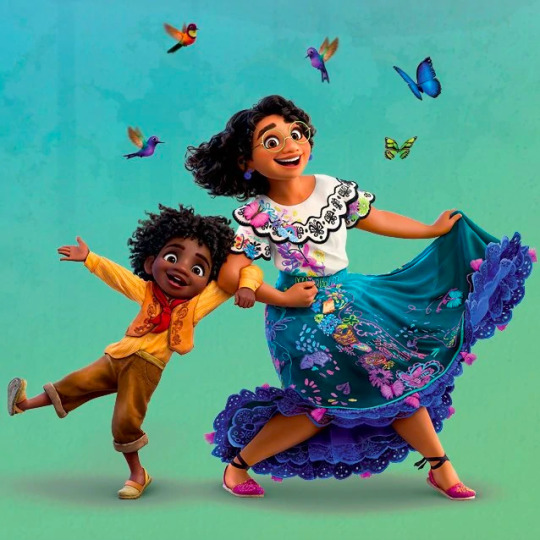
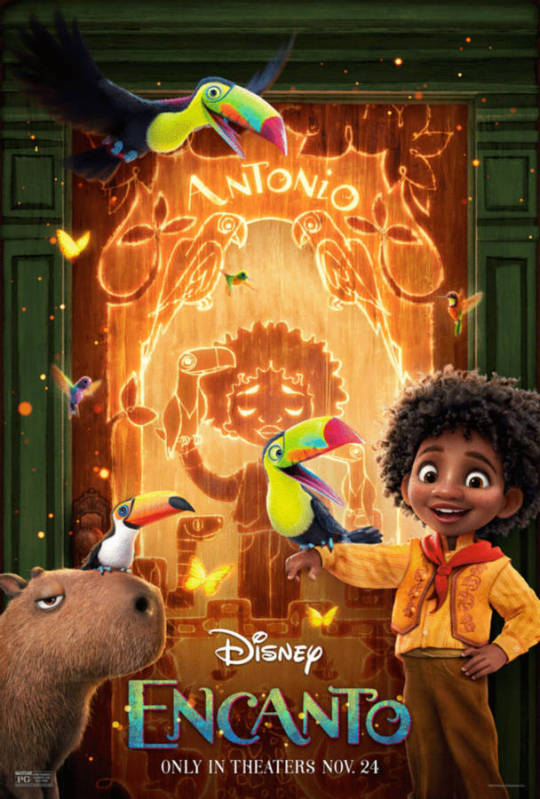
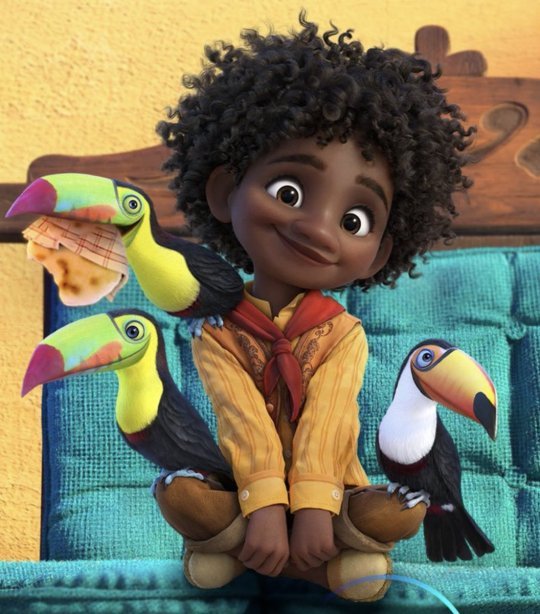
All pictures above: promotional or merchandise
In the movie pictures: below

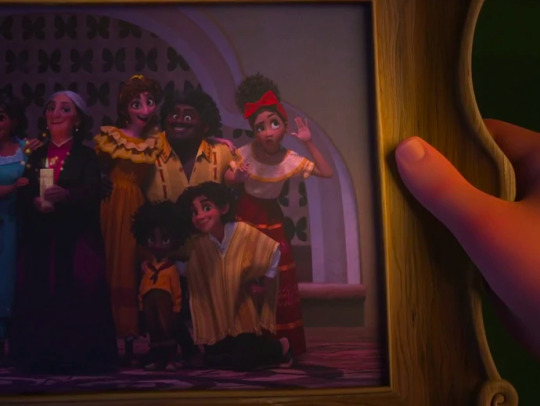
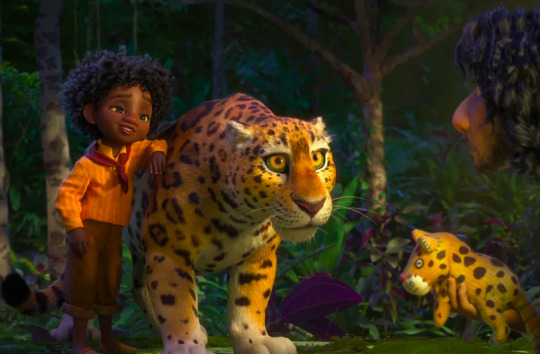
All of this to say, I have a headcanon that’s canon compliant as to Antonio getting his vest!
So, I hc the ‘gift motif clothes’ are the presents that the kids parents give their kids for their birthday once they have been gifted. Alma had it done for the triplets and once Isabela got her gift, Julieta carried it on. (I don’t know how clothing design works, but I assume they’d have to like have it done by professionals which leads to a separate hc I have about why gift-less and therefore technically motif-less Mirabel picks up sewing and embroidery but that’s neither here nor there just thought I’d disclaim and apologize if you do know how clothing works and I’m just saying nonsense).
After Casita fell and the gifts were gone, Pepa had no reason to get him a special ‘gift motif accessory’ and didn’t want to reopen that wound of him having a gift for like a day only to lose it. Once the gifts come back, on his door carving (and the front door carving) he has this vest. So designs on a vest it is! (as opposed to say a ruana/poncho like Camilo and Bruno). And a late birthday present for Antonio once the gifts return!
#Encanto#encanto headcanon#encanto antonio#antonio madrigal#the madrigal family#warm colored madrigals#pepa's side of the family#encanto clothing#encanto character design#encanto analysis#I am reading WAY deep into character designs for a childrens movie#but it be like that#someone write a ficlet of pepa and felix gifting him this vest#OR them asking Mirabel to be the one to do the embroidery#I am SO bad at writing fluff#but if I ever get the motivation#maybe ill write it
28 notes
·
View notes
Text
Encanto: Madrigal Family Relationship Analysis Part 28 - Antonio and Bruno
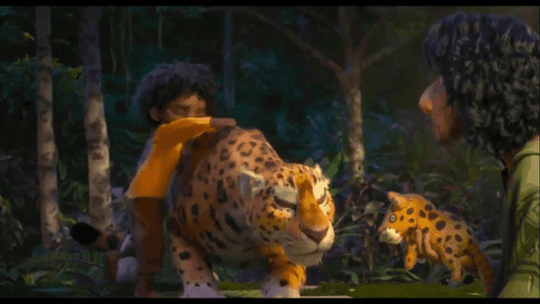
This is my favorite moment between this uncle and nephew duo; admittedly, it's one of the very few scenes they have together, but I still stand by my point. Antonio offers his stuffed jaguar, made by Mirabell (his favorite relative), to Bruno (a man he's just met and only heard about through his family and town's bias opinion). Jared Bush as confirmed in a twitter post that Antonio considers Bruno his pal. And I can understand why - given his gift, Antonio was told by Bruno's rats not only of the future teller's true personality but also the lengths the latter went to, to protect Mirabel, who Antonio greatly loves, cherishes, and admires. Of course, he would think of Bruno as his pal. And while it wasn't seen in the movie (which should've been), Bruno definitely returned Antonio's jaguar and genuinely thanked his young nephew for the help. And they would develop a tight bond because they are both shy but helpful guys who have an affinity towards animals more than people, and would do anything to help Mirabel, the person in the family who helped them the most (not hating on the Madrigals but the way Mirabel helped them was more beneficial). I can totally imagine Antonio cheerfully dragging Bruno along to play with him and his animals and Bruno happily agreeing since he loves being an uncle in general. I can also see Bruno trying to give good advice to Antonio that it's okay to prefer animals to people, a similar convo like the one Mirabel and Antonio had before his gift ceremony. In conclusion, these are PHENOMENAL PALS FOR LIFE.
#disney#encanto#bruno madrigal#antonio madrigal#madrigal family#fam analysis#madrigal family relationship analysis#my posts#favfams#fam appreciation
52 notes
·
View notes
Text
Due to my annual rewatch I finally need to say something I haven't read anywhere:
Bruno's Vision about the Dolores shows that he didn't see far enough. He also did this with the vision that Mirabel sees, because he broke up before he could see the whole thing, or the true ending.
With Mirabel, he first sees her breaking (or not breaking) Casita, then she's there with him 10yrs later and tells him to see more, so he sees the butterfly and the Isabela Hug.
With the vision for Dolores he probably saw her being sad while looking at Mariano (or "A guy"), and probably COULD have seen more, if he just waited.
And that may be true for more than just these two visions.
#encanto#madrigal#family madrigal#bruno#mirabel#abuela#isabel#vision#dolores#luisa madrigal#bruno madrigal#canon#mariano guzman#encanto mariano#encanto analysis#encanto movie#casita#visions
11 notes
·
View notes
Text
Encanto and flaws:
seen a comment a while back saying “mirabel is a self absorbed character”. And ultimately it got me thinking. Do I believe that mirabel is self serving and self obsessed? no, I don’t but what that comment did point out is that even though mirabel is the main character she’s not 100% good all the time. and that’s a good thing because people aren’t 100% good all the time. It also told me once again about the theme of this movie, perspective. The film is from mirabels pov so we immediately see everything about her family through her. Some people say mirabel was ignorant at the start of the movie and didn’t care enough about other peoples problems forgetting that lack of communication was something this family IMMENSELY suffered with. Mirabel didn’t know any better because nobody would communicate that with her. She’s not a very self pitying character as through my viewing of the movie I would see as the type to suck it up and push it down to help everyone else. I wondered why that person singled out mirabel in particular though, yes her actions had selfless and selfish motivations like any human would we also want to make ourselves happy. Mirabel was mistreated and wanted to be appreciated but she also cared deeply about the people in her life and wanted to solve what was going on. Being selfish isn’t always a bad thing, encanto shows that! Isabela for sure example put on such a good mask that mirabel (and the audience) had perceived her as self absorbed and mean. Ultimately I think every character in this movie is “self absorbed” to an extent because none of them actually realize that the other is suffering, it’s the lack of communication that leads to this. I think you can argue at the start of the movie mirabel was ignorant (not in a bad way) but so was everyone, mirabel was the only one willing to change that, she wanted better for herself but she also wanted better for her family. All she wanted to do was to make her family proud, to be accepted. Self absorbed is when your actions have solely selfish motivations and lack of care for other people, everyone was self absorbed in some way but not at the point you can outright label it. The thing with encanto is these characters have layers to them even though mirabel is our protagonist she still has flaws, she’s overly persistent and passionate often stubborn and forgets to think things through and it’s those qualities as well as all her other ones that make her such a well rounded character. Basically encanto characters are too nuanced to just have single labels pinned on them.
#encanto#encanto disney#disney encanto#mirabel encanto#character analysis#encanto isabela#madrigal family
39 notes
·
View notes
Text
It's way too late but who cares! Here is my analysis of the Polish translation of the first song from Encanto, Family Madrigal!
Just a headsup, this song is one of the "just good" ones, so dont expect any fireworks like with WDTAB (we'll save those emotions for What Else Can I Do because boy)
*I'll start by noting that I really like how in the og version they made "drawers" rhyme with "floors" and "doors" even though it shouldn't be possible
+ Then again, Mirabel's Polish VA balances it out by having more enthusiasm in her voice when she sings this part than her English predecessor had
+ I have to say I prefer "time for the show" over "let's go", and this is also a good example of when using a macaronism/slang term works really well
-"Here's the family" I know "my family" wouldn't fit but it just sounds weird x)
+ "We're all here thanks to her" I think sounds a little better, sweeter maybe than "She led us here so many years ago"
+ "It's better (for us) with each new day" > "every year"
+ And here I'm conflicted, because "I'll tell what I know from this story" just sounds better to me, like more in character? But it's kinda far from the original "There's just a lot you've simply got to know". Though at the end of it I think I like the dubbed version better
= "And it's okay" instead of "We're on our way" I know it was made to fit the sound of the original but it's a very interesting choice I'm not convinced about
= "This is my family Madrigal" instead of "I'm part of". For me Mirabel's constant assurances that she's part of the family were quite unnatural but I mean, I guess that was the point and part of her characterization/foreshadowing of her problems so
+ Coffe got diminuted into "kawka" <3
*I just wanted to make a note that if you can follow an og line with a dubbed line and it still sounds fine, then you know the translation is good
+ I'm not going to translate the whole line but I think the internal rhymes in the line "her recipes are remedies for real" work even better in Polish
+"It's not a dream, it's something fantastical, somthing magical/It's my family Madrigal" again we loose the foreshadowing but it sounds better
+Okay here are the fireworks I just love how the part about Felix and Agustin got transalted, just, the internal rhymes in "wój mój" and "za to tato" (the use of tato in Nominative is so informal <3) and it sounds even faster than in the original despite having the same if not less syllables it's just *mwah*
*I feel like I should say something about the use of "pocisnę" which is very slang, and "time sheet" (like you have in school) but I don't know what so here
-"Camilo changes (himself)" sadly we don't have a verb to shapeshift 😔
+"Antonio will find out his gift today" instead of "get", I like it, it implies they all already have it and the ceremony only like, outs it (And if you want to go the angsty route, this might've been what made Mirabel think she's talentless, the ceremony didn't out any gift cause she never had any)
-"She makes a flower carpet in seconds" no sass for Mira here
+ "Her brain and lion heart" lion heart <333
-"Look for me in the family Madrigal" I... absolutely don't understand this line
+ I like the use of the word biographical in the og line, but Polish one is more natural, kinda like she's no longer really singing a song, but just speaking normally and fitting into the melody and rhythm simply by the laws of musical
+ English: Julieta, better, arepa; Polish: Julietę, arepę, lepiej
+ Also the town chants "talk aabout yourself, Mirabel!" so again, more direct
-We lose the meta joke about Dolores hearing the chorus
+ Instead of just "what are you doing" abuela uses a stronger word (so not "robisz" but "wyczyniasz")
+ And finally I don't know why but just, Dolores' line is much more funny to me in Polish XD Maybe it's because of the archaic/poetic word order, maybe it's the delivery, but yeah
So generally, even though I've noted out many strong points, these are the kind that I only noticed now during this analysis, so I guess they've added a lot, but still in general it's just, equally good.
#my post#encanto#the family madrigal#family madrigal#polish dubbing#dubbing#translations#encanto song#translation analysis#languages#hm i should make a tag for those#since i dont plan to stop XD#yes that means you can expect the rest of the song this whenever!#and id sum this song with one polish idiom -#theres no frenzy ass doesnt fall off#edit:#blue's bafflegabs
11 notes
·
View notes
Text
Bruno and the murals
You know what Encanto fam? I think it’s very interesting how in the Madrigal mural in town, Bruno’s part of the painting is perfectly normal and not scrubed off or damaged in any manner. However, the painting on his door in Casita was blocked from sight with with wooden boards.
Why I found that interesting? About halfway into the movie, it’s all but directly stated Bruno only became an outcast in town because people either took his bad prophecies as granted eventes, or blamed him for small unfortunes. It would be fair to assume such petty people would absolutely get him off the tribute of the amazing Madrigals, right? Except it shows the townsfolk didn’t have any real problems with Bruno himself, but with what his visions made them think/feel.
Besides humans’ awful habit of searching for scape goats (which certainly was the root of the problem in some cases), all the people in the Encanto are either survivors from a violent attack that destroyed their former community or direct descendents of them. They too only survived because of a magic that no one understood. Of course there would be people who would get paranoid about Bruno’s visions. Of course they’d want to think he could seal their fates. They wanted the visions to provide security, but when they didn’t do it, their belief about how Bruno’s power worked and traumas made them assume the worst of the prophet. But it didn’t mean their dislike of Bruno ran deep. That’s why they didn’t try to erase the visual reminder of him in town, while his image was banned from his own door. They might have actually felt bad for him after he vanished.
His door being sealed off and his somewhat faded image in the mural inside Casita probably was meant to represent how the Madrigals that knew him well probably felt about his passing overall (because of course each individual had their own way of grieving him). All of them wanted to let him go for good because he just vanished on a particularly difficult night for everyone and didn’t give anything for closure. It wasn’t about Bruno annoying them or reminding them indirectly of a traumatic experience. He was a family member that no one could fully understand and that left them. Add that to the fact that the Madrigals didn’t have a good grasp on communication until the ending of their movie, and you have a pretty clear picture of what would follow.
#please pardon me if this came across as too much apology#but i wanted to dive deep about this contrast#also bruno is a great man#but guys#he started hiding in the same night his five-year old niece was traumatized#there's no excuse for this method of protection#just ike there's no excuse for the whole#we don't talk about bruno thing#analysis#bruno madrigal#family madrigal#encanto
10 notes
·
View notes